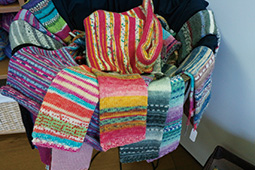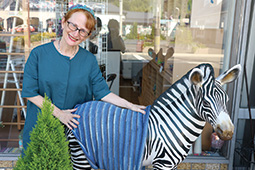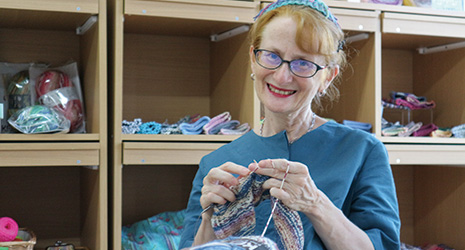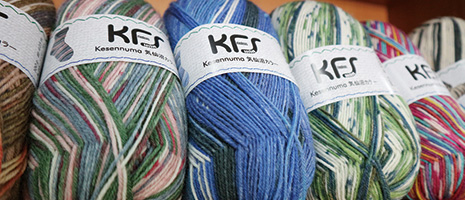INDEX

Samples of knitted yarn on display in the store 
Umemura with the storefront zebra mascot
September 2020
Using Knitting to Support Recovery and Reconstruction

German-born Martina Umemura supports the recovery and reconstruction of disaster-stricken areas in the Tohoku region and brings people together through sharing the joy of knitting.

When getting off the train at Kesennuma Station on the JR Ofunato Line, which connects the inland part of southern Iwate Prefecture with the coastal region of northern Miyagi Prefecture, there’s a small, charming shop right in front of the station. Step inside and your eyes will be drawn to the many colorful bundles of yarn. This shop is KFS (Kesennuma Friedenssocken), which carries yarn for knitting and more, established by German-born Martina Umemura. The company’s name means “peace socks” in German.
Umemura, who was a medical student in Berlin, first came to Japan as a researcher in 1987. She transferred from Gunma University to the graduate school at Kyoto University, continued her research, and got married in Kyoto. Later, when she became a mother and it was hard to find time for research, she took it into her head to start knitting. She says, “In Germany, children learn how to knit socks at school. I really liked that. Then my mother in Germany told me that there was a factory producing attractive yarn near their house in southern Germany. The yarn from that factory was very interesting. It was not a single color but dyed with a variety of colors, producing a variety of patterns through knitting. It was truly magical yarn.”
She then quickly sent off for some yarn made by TUTTO, the company producing that magic yarn, knitted some socks, and then gave them to coworkers from the university where she taught German at the time. “Everyone was very pleased, but Japanese people will always give a present back in return. If that was the case, then I thought that if I accepted money and spent it on something useful for society, then everyone would be happy.” This is what started her work towards “Peace Socks” (Friedenssocken). This name comes from her work selling knitted socks at a craft market in Kyoto in 2003 and donating the profits to someone she knew who was supporting recovery from war damage in Afghanistan. Umemura gradually expanded her activities.

And then, the Great East Japan Earthquake happened in 2011, and being unable to contain herself seeing the state of the disaster-stricken areas in the media day after day, she sent donations of relief money from Kyoto to the affected areas in the Tohoku region. She also sent knitting sets with yarn and needles to people who were living in shelters, saying, “You can be free from troubling thoughts when knitting.” Soon thereafter, one of the shelters in disaster-affected Kesennuma City asked her to send more yarn, and a connection between Umemura and the people of Kesennuma was forged.
After a year had passed since the earthquake and people from the disaster-stricken areas were trying to return to normal life after leaving the shelters, Umemura began to consider how it was essential for these people to have a place to work. And so, in 2012, she established the Umemura Martina Kesennuma FS Atelier Co., Ltd. in Kesennuma. Currently, ten local female employees import and sell TUTTO-made yarn, and knit and sell cylindrical Haramaki-Boshi (bellyband hats) and Peace Socks, which have become synonymous with Umemura.

Learning of Umemura’s activities, TUTTO proposed a project for a private brand, and they now produce unique yarn for KFS. There are more than 100 varieties of yarn that have been developed by KFS, including the Kesennuma Color series, inspired by the nature and lifestyles of Kesennuma, the Family’s Smile series, which imagines each member of the family, and more.
Among the yarn varieties is a zebra color yarn designed by TUTTO for activities to protect the tropical rainforests. As this color is a favorite of Umemura’s, there is a zebra mascot placed outside the KFS store. Zebra mascots slowly began to increase in number, and before long, they spread out from the shop all across Kesennuma city. Just as Umemura believes that knitting connects people, the zebras seem to be running around the city as messengers of peace.
(Note) Name order is the order used and preferred by the interviewee.

